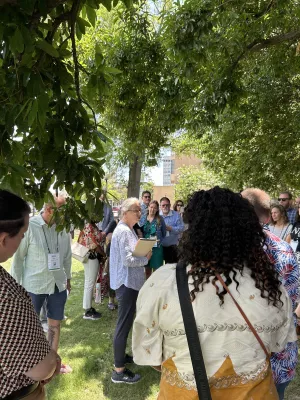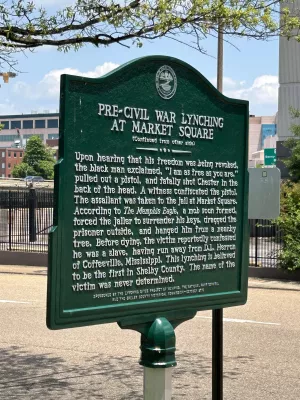Immersion Experience TWK Annual Conference June 20, 2023 Fred Morton
My earliest glimmer of deep troubles in our Southern way of life came during sophomore year college when I read that world changing monogram The Strange Career of Jim Crow by a stanchly raised Methodist historian C. Vann Woodward. That together with a major history Professor and United Methodist theologian Paul Ramsey who prayed for the safety and success of civil rights workers in his home state of Mississippi in the 1960s. These got my attention and influenced my call to ministry. That call was steeped in serious social justice and the dismantling of segregation. But as many in my class of seminarians then learned, that mother church would be less than a ready vessel of social transformation.
Over the decades there was progress of sorts----by fits and starts almost. Systems of segregation were partially dismantled and ceilings for education and professional engagement were extended to minorities. But only to a limited degree. Large portions of our populations led lives of deep impoverishment . Systems of oppression many of us thought long deceased raised their ugly heads and conspired to keep the poorest among us at a discouraging low level of life and opportunity.
Many among us puzzled how could this be. And then it dawned on us that the roots of prejudice were buried deeply in our history and its trouble legacy of slavery and racial violence.
Some of us on this erratic journey began to ponder, how have we strayed? What has been left unsaid or unattended to? It fell to inspired workers with offenders and the dispossessed like Brian Stevenson and others to remind us that the deep legacy of racial violence in our nation’s past had persistent longevity. Times of reckoning of that past called out for recognition and atonement—painful as that experience might be. The pernicious racial violence which persisted into Reconstruction era following emancipation of slavery continued to oppress a people centuries long in slavery.
I joined a local group researching accounts of local lynchings in Shelby County—later to become the Lynching Sites Project of Memphis and focusing on a cluster of tragic events at the close of the Civil War on into the present era.
At this point very limited understanding of my own family’s history, I took considerable solace with the notion that my forebears had little if anything to do with these dastardly deeds. Little did I reckon with the sobering realizations our Mormon friends could bring with Ancestry.com.
My own limited notions were of a pretty sober American ancestry far removed from slavery. My pedigree reached by to Plymouth Colony to founder of the Morton line in America, one George Morton. He was nephew to Governor Bradford and came to this continent on the Ann about a year after the Mayflower. This group of dissenters, known as the Pilgrims, from Nottingham England a small band of separatist from the Church of England more Baptist in their theology. They were working class folk with meager learning and virtually no professional training as compared to the more affluent and educated Puritans to come several years later. Descendants included men who served in the American Revolution and most migrated further South to North Carolina and Western territories—then Mississippi.
As my own immediate ancestors were from Arkansas and primarily of yeoman stock I had assumed they were never among gentry slave owners. To which I took great solace. Imagine my chagrin when days before I was to give the message at our first memorial service for Ell Persons(murdered 1917 out off Summer Avenue before crowds of thousands, I learned among my Morton ancestors one distant uncle Thomas Horton Morton owned 16 slaves ages 30 to age 2.
Busted! Well there I was, guilty as any for having benefited from the horrendous practice of involuntary servitude. I could no longer savor any moral immunity from this horrendous transgression. So I had to enter the services of holy penance as a full participant.
So I continued this holy work as this small but committed community of quite diverse people researched and orchestrated events to commemorate these dastardly murders in the greater Memphis community. It was revealing and rewarding. Sometimes there were reunions of descendants of victims decades gone by re-united. Sometimes there were meetings of victims’ descendants meeting with descendants of perpetrators or local officials at the time. There have been several highly memorable community celebrations. And now currently one of LSP’s tireless chronicles Laura Faith Kebede has produced highly quality podcasts on major historical events related to racial violence—completing the heretofore incomplete history of racial violence locally.
This has been the work of completing that woefully incomplete history and incorporating public services of remembrance. This has been very holy healing work. And it has been the case through out that descendants of those so violated and murdered have shone extraordinary grace and magnanimity to those of us on the perpetrating sides. Yea, I dare say we have been embraced much as were Joseph’s brother with forgiveness, even love.
But that leads to the final leg in my pilgrimage—that of restitution and redemption. It became clear to me that a reckoning of these wrongs without restitution and reparations left our work woefully incomplete.
So some five years into that journey I shifted lanes and took the route of social action. I signed up with the Poor People’s Campaign in 2018 and participated in this successor movement of Dr. King to address the root causes of endemic poverty and segregation in America. And as well I signed on with the newly emerging social justice organization MICAH(Memphis Interfaith Coalition for Action and Hope) to labor in our local vineyard.
And so that is where this pilgrimage has taken me this last near decade.
The Rev. Fred C. Morton, elder retired Tennessee West Kentucky Annual Conference UMC




